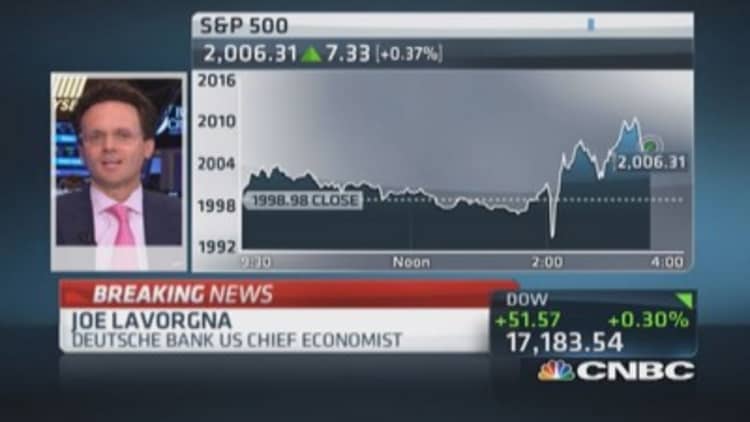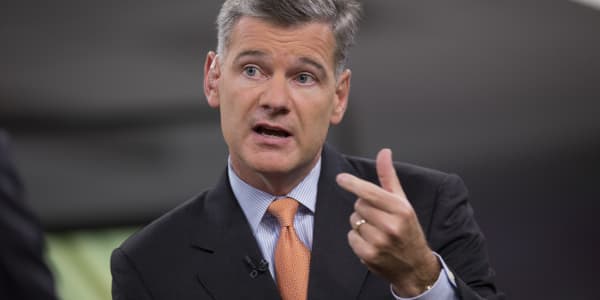A top Wall Street investment expert doesn't see a stock or corporate bond crash coming anytime soon—even if it's tough to spot cheap assets and slow economic growth is likely to continue.
"Does this mean we should all just move to cash? I don't think so," Russ Koesterich, BlackRock's chief investment strategist, said Wednesday evening at the Morningstar ETF Conference in Chicago.
"It does mean you have to be very selective. It does mean you should have more modest expectations for what your returns are going to look like over the next five or 10 years where valuation really matters, but I don't think that this suggests that stocks or, let's say high-yield (bonds), are about to crash."

Koesterich said that the value of stocks, while expensive compared with their long-term average, wasn't yet consistent with previous market peaks. In the U.S., he said stocks usually haven't hit a top over the last 25 years until the price-earnings ratio of the has passed a multiple of 20 times. The ratio is about 18 times today, using a trailing 12-month calculation.
"That still leaves us somewhere in the sixth, seventh or eighth inning, but I don't think we're on the verge of a bear market, at least not a bear market that's caused by high valuations," he added.
Koesterich said demographic challenges and tepid job and wage increases were among the factors that would slow long-term growth, even if the economy will expand about 2.5 percent over the next one or two quarters.
"We're in a cyclical recovery—that's the good news," Koesterich said. "The less good news is that that speed limit about how fast the U.S. economy can grow is arguably lower than it was."
The effect, he said, is a more challenging investment environment, but there are still pockets of opportunity.
Koesterich recommended several types of stocks.
In the U.S., he said to look at large-cap stocks, or those of big companies, because of their relative resistance to government monetary policy changes.
He also touted cyclical stocks—industries like manufacturing that correlate with normal economic cycles—because they will benefit from a strengthening economy, a precondition for interest rates to rise. Specific sector examples included technology, energy, manufacturing and financials.
Internationally, Koesterich said many developed markets offered lower-cost stocks with higher yield relative to the U.S. He singled out Japan as a place where equities were comparatively cheap and could gain in value over the next six to 18 months despite the country's long-term debt and demographic challenges.
He cited increased domestic pension fund allocation to the local stock market and more borrowing and share buybacks by Japanese companies.
He also said emerging markets like China, India and Mexico were attractive. He said Russia was "cheap for a reason" and the investment thesis for Brazil depended on the outcome of the upcoming presidential elections, apparently echoing a relatively common Wall Street view that if incumbent Dilma Rousseff leaves office the economy will benefit.
Koesterich still generally recommends stocks over bonds because of their relative price. But he said some areas of fixed income were attractive, including high-yield corporate bonds because of their relatively low default risk in the U.S.; emerging market sovereign debt because of the relatively low debt of the countries issuing them; and tax-exempt municipal bonds because they are unlikely to have their tax treatment changed by Congress.
"You have to take on some additional risk," Koesterich said. "The question comes down to what parts of the market looks like they give you some reward for the risk you're taking."
—By CNBC's Lawrence Delevingne







